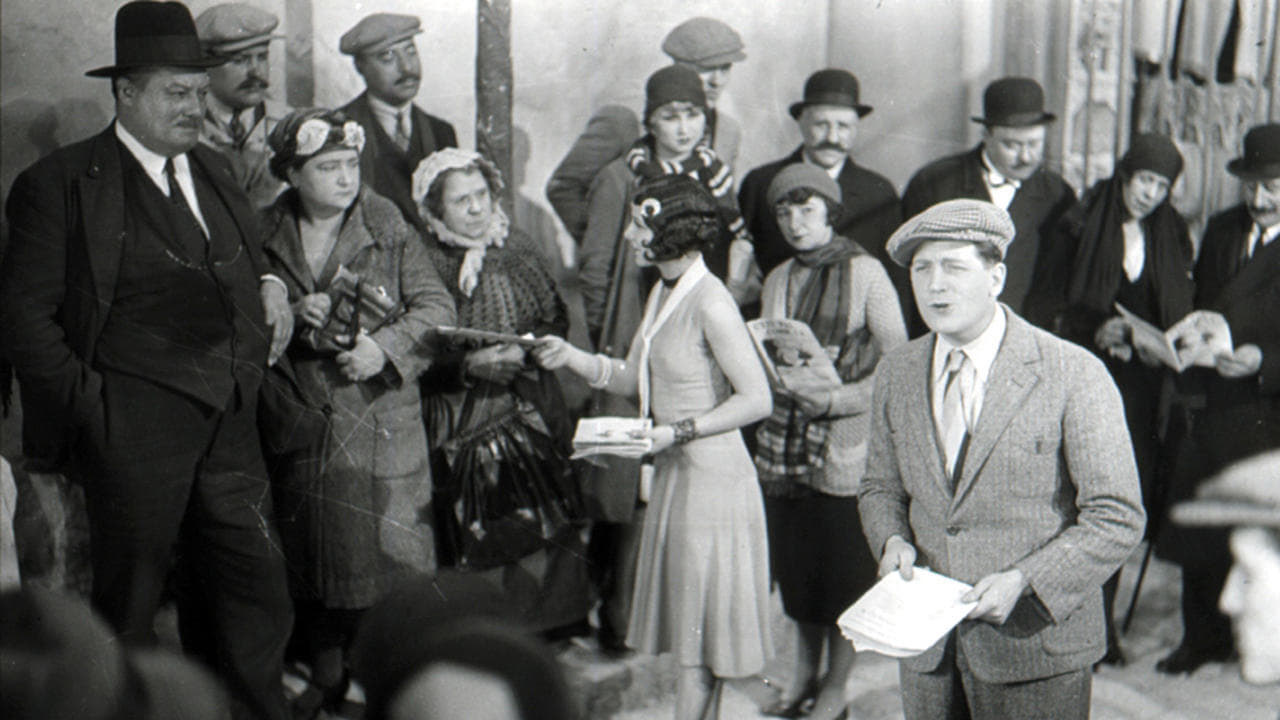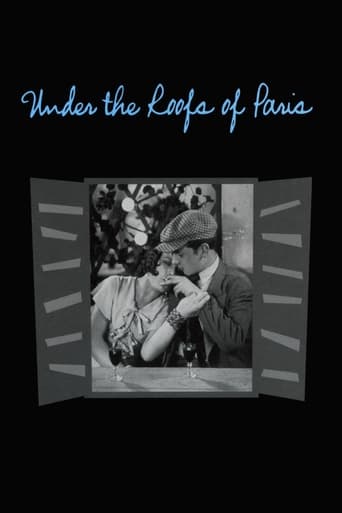BlazeLime
Strong and Moving!
Limerculer
A waste of 90 minutes of my life
Gutsycurene
Fanciful, disturbing, and wildly original, it announces the arrival of a fresh, bold voice in American cinema.
Cassandra
Story: It's very simple but honestly that is fine.
Claudio Carvalho
While singing in a lower class quarter in Paris, the street singer Albert (Albert Préjean) falls in love with the Romanian party girl Pola (Pola Illéry), who is the companion of the gangster Fred (Gaston Modot). One night, Albert meets with Pola, who has just found that Fred had stolen her key, and his friend Louis (Edmond T. Gréville) proposes to toss to date her. However, Albert brings her to his room and they spend the night together, with Albert sleeping on the floor and Pola on his bed. Early in the morning, the pickpocket Émile (Bill Bocket) brings a bag with stolen pieces and asks Albert to keep the bag for him. When the police busts Albert's room and finds the stolen goods, he is arrested and sent to jail. Meanwhile Fred travels and Pola seeks comfort with Louis, and they stay together. When Émile is arrested by the police, he confesses that Albert is innocent and he is released and seeks out Pola. Meanwhile Fred returns to Paris and also seeks out Pola that is with Louis. The three men that are under the spell of the gorgeous lady dispute her love and only one wins."Sous les Toits de Paris" is a film with a wonderful transition between silent and sound eras. This is the first René Clair's film that I watched and I found very original and interesting the style of this director that uses the acting of silent movies with gestures and facial expressions and dialogs instead of intertitles, everything supported by the marvelous song "Sous les Toits de Paris" and impressive camera work. The paradox of this delightful film are the low-life characters, composed by pickpocket (Émile); gangster (Fred); a pickpocket that steals the girl of his friend (Louis); and an easy woman (Pola). It is also unusual that the girl does not end the story with the good guy, showing no commercial concern like in most of the Hollywood movies. Not only Albert, Fred and Louis, but I have also been bewitched by the beauty and charm of Pola Illéry. I did not find any information about the death of this actress in Internet. My vote is eight.Title (Brazil): "Sob os Tetos de Paris" ("Under the Ceilings of Paris")
Alex da Silva
This story follows the fortunes of Parisian petty street criminals, and, in particular, street busker Albert (Albert Prejean). He falls in love with Pola (Pola Illery) but things don't work out as he plans....This is a good film despite being full of detestable characters. Albert's best friend steals his girlfriend and is quick to fight with him, and another colleague is a pick-pocket who is responsible for sending him to jail. Then there is Fred (Gaston Modot), a womanizing leader of a street gang. Fred is also involved with Pola and he remains a nasty piece of work throughout the film. However, worst of all is Pola - what a slag! She sleeps with everyone and seems to have no loyalty. She leads Albert on and doesn't let him score with her in his bedroom. She sends very mixed signals.This bunch of no-gooders ensures that we sympathize with Albert and root for him throughout the film as he is the only character that shows us any decency. He is far too good to be mixed up in the life that he leads. The way that the film ends can only be seen as a blessing for him.The film is half silent and the use of sound and silence is effective in each particular section, eg, the fight scene which also contains a funny moment - watch as Albert is offered a selection of knives for his fight with Fred. He inspects them all and rejects them all with an air of superiority before giving Fred a quick slap around the head and starting the fight. Even though the film is French and so the talking sections sound like "hongh-hi-hongh-hi-hongh", this is an entertaining film with some excellent camera shots and a catchy main song.
zolaaar
The film marvellously shows the nostalgic dream of the old Paris and its common people. With melancholic irony, Clair tells a story of the milieu of backstreets and backyards, of street singers, pickpockets, fiddlers and strange townsmen. Here, his grasp into the present does not become realistic depictions of circumstances, but a poetic romance, for which reality is only one aspect of life.In this regard, especially the sound has turned out quite well. And how hesitantly Clair used this new technical innovation! His generally critical attitude towards sound in films induced, that "Sous les toits" is mainly composed of silent parts (including many dialog scenes), which are highlighted with music or noises such as trains driving past. The song "Sous Les Toits De Paris" of Albert, the street singer, becomes to the red thread which links several scenes and bridges time distances. A fight taking place in the dark only informs the viewer through noises. For that, we witness a dispute, where the matter is uninteresting and predictable, without any sound - shot through a glass door. One can say sound is especially used for enrichment and left out when it would be needless. Thus, a film came into being that wonderfully combines sentiment, humor and intelligence with languishingly beautiful tunes.
keekeedee
--- this film changed my views on b&w, i first saw this when i was a wee lass of 13, awkward and shy, all i had to do with myself was watch late- night t.v. i cried so hard at the end of the film i thought for sure i'd wake my mum, thank god CBC showed it again not long after that, and like the big geek i was, and probably still am, i taped it, i liked the rawness of it, the sound wasn't very good, but it didn't matter, still doesn't, i would love to make a movie that has this same feeling the absolut "realness" i dislike the crud hollywood keeps churning out, but , the fact remains that i live in this time, and am almost forced to swallow the disgraceful porridge that is cinema. it's christmas day, i think i'll go slip on my "under the rooftops of paris" and dream of a time when film still had a heart!!

